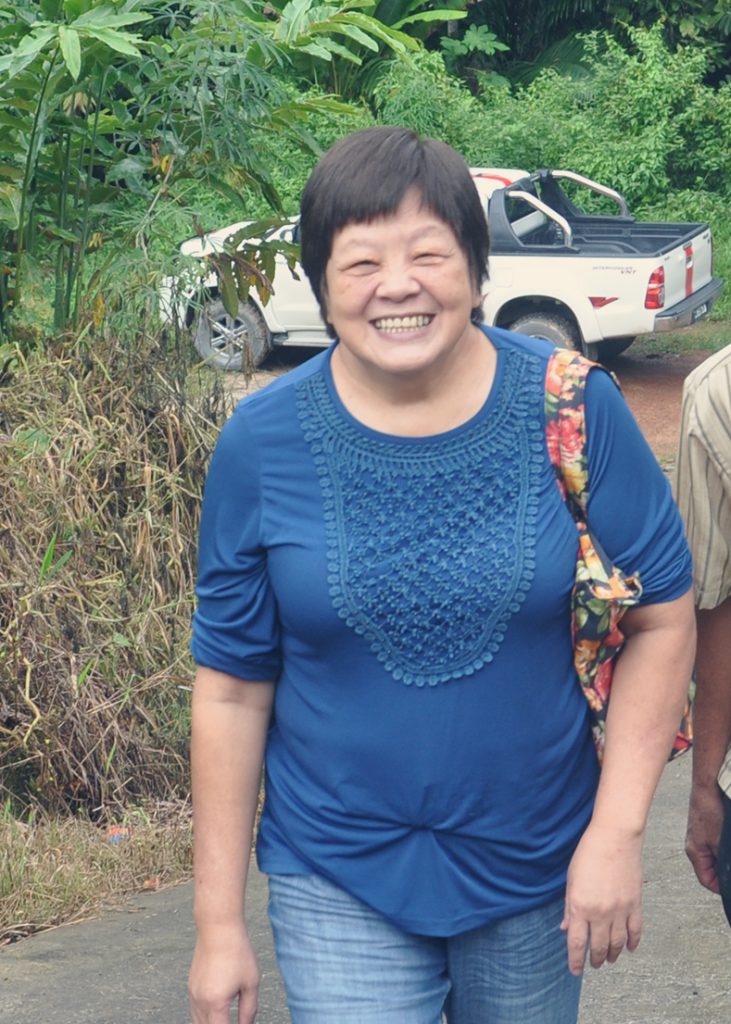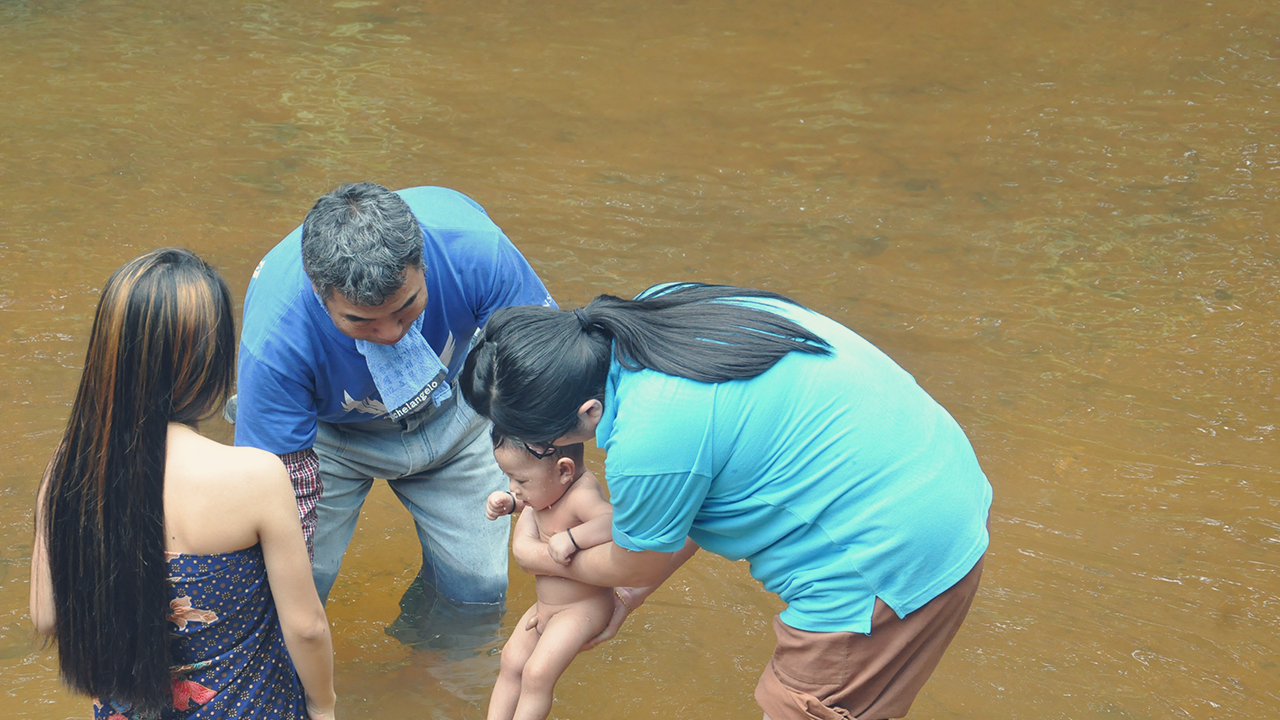BEING BAPTIZED = “BASUH KEPALA”?
受洗=洗头?
受洗=洗头?
written by BOE local missionary, Ling Leng King
Thanks Lord for His leading, protection, and caring. I’m serving Him in this position (local missionary) over five years. I never expected time flies so quickly Originally, I only wanted to respond to my own decision “Serving for one year in my whole life” after took a course named Green discipleship. But when I saw there are still a lot of unreached people, Lord said to me: “There are so many crops to be harvested, and the workers are scarce. Where are you?” Then I decided not longer to give up easily.
Over these years especially when I went to longhouses, my inner feelings and struggles became deeper, and each time I felt it differently. Sometimes I’ll see their superficiality of their beliefs—they struggling to answer who is Jesus/God, let alone what kind of God they believe in; They didn’t understand the meaning of being baptized or what is baptism. They think that baptism is helping them to wash hair (Nuchi pala/masu pala), and after washing their hair (udah masu pala), they will become Christians. Because when I asked them are they Christians, some would answer a pastor had already washed their hair (masu pala); and some would say they already been baptized (suba udah masu pala) but without baptism certificate; they even asked me when their hair can washed again ( Kamaia ulih masu pala baru). We can see that they value certificates more than their faith towards Lord, and they still believe in superstitions and hanging their “things” in front of their room.
How to confess to God
Last year, when two Iban pastors and I went to one of the longhouses, I saw that a converted Iban girl had entered the longhouse to teach English and mathematics to the children. I felt struggled. What will they be like in the future, should we stand aside and watch them converted? If we don’t work hard to preach and teach, how can they hear, understand and believe? How can I explain to God when I come to God one day?
When we went to Sg. Rian in Saratok recently, the longhouse sisters told us: “Not only the adults not being taught properly, the children are even more pitiful. No one has ever came here to taught us the Bible.” They responded to me when I was about to start Sunday school ministry. After hearing their responses, I made up my mind to start Sunday School on the evening of May 11th and 12th, 2019. Thankfully, six adults and eight lovely children attended Sunday school. I pray that the Lord will lead the local residents to complete the unfinished gathering place as soon as possible (because the floor still full of sand and we can’t use it).
Lastly, I hope more brothers and sisters not only will pray for us behind the scenes, I also hope that more brothers and sisters will stand up and walk with us into the inland of Sarawak to win more souls; because the Lord said: “The harvest is plentiful but the workers are few.” (Matthew 9:37). So, where are you?
Thanks Lord for His leading, protection, and caring. I’m serving Him in this position (local missionary) over five years. I never expected time flies so quickly Originally, I only wanted to respond to my own decision “Serving for one year in my whole life” after took a course named Green discipleship. But when I saw there are still a lot of unreached people, Lord said to me: “There are so many crops to be harvested, and the workers are scarce. Where are you?” Then I decided not longer to give up easily.
Over these years especially when I went to longhouses, my inner feelings and struggles became deeper, and each time I felt it differently. Sometimes I’ll see their superficiality of their beliefs—they struggling to answer who is Jesus/God, let alone what kind of God they believe in; They didn’t understand the meaning of being baptized or what is baptism. They think that baptism is helping them to wash hair (Nuchi pala/masu pala), and after washing their hair (udah masu pala), they will become Christians. Because when I asked them are they Christians, some would answer a pastor had already washed their hair (masu pala); and some would say they already been baptized (suba udah masu pala) but without baptism certificate; they even asked me when their hair can washed again ( Kamaia ulih masu pala baru). We can see that they value certificates more than their faith towards Lord, and they still believe in superstitions and hanging their “things” in front of their room.
How to confess to God
Last year, when two Iban pastors and I went to one of the longhouses, I saw that a converted Iban girl had entered the longhouse to teach English and mathematics to the children. I felt struggled. What will they be like in the future, should we stand aside and watch them converted? If we don’t work hard to preach and teach, how can they hear, understand and believe? How can I explain to God when I come to God one day?
When we went to Sg. Rian in Saratok recently, the longhouse sisters told us: “Not only the adults not being taught properly, the children are even more pitiful. No one has ever came here to taught us the Bible.” They responded to me when I was about to start Sunday school ministry. After hearing their responses, I made up my mind to start Sunday School on the evening of May 11th and 12th, 2019. Thankfully, six adults and eight lovely children attended Sunday school. I pray that the Lord will lead the local residents to complete the unfinished gathering place as soon as possible (because the floor still full of sand and we can’t use it).
Lastly, I hope more brothers and sisters not only will pray for us behind the scenes, I also hope that more brothers and sisters will stand up and walk with us into the inland of Sarawak to win more souls; because the Lord said: “The harvest is plentiful but the workers are few.” (Matthew 9:37). So, where are you?
感谢主的带领、保守、看顾,我在本地宣教岗位上服侍祂将要五年了。回想起来,时间真的过得很快。当初本来只想回应上好“青本门徒课程”之后的决定——“一人一生献一年”。但,当我上了工场看到那许许多多未得之民,主说:“要收的庄稼多,工人稀少,你在哪里?”所以我再也不敢轻易说放弃。
这些年来,特别是去到长屋时,我内心的感受及挣扎就越深,每一次都有不同的感受。有时会看到他们信仰的肤浅——问他们谁是耶稣/上帝,他们多答不出来,更不用说他们所信的是怎样的一位上帝;很多也不明白受洗的意义,也听不懂什么是受洗(Baptisa),他们会认为受洗是洗头(Nuchi pala / masu pala),洗头之后(udah masu pala)就是基督徒了。因为当我问他们“是基督徒吗?”,有的会回答说什么时候哪一位牧师已经为他们洗头(masu pala)了;有的会说已经洗头了(suba udah masu pala),但没有信/证书 (surat) ,几时能再洗头(Kamaia ulih masu pala baru)。从这里可看到他们看重证书多过信心,很多门前/家里还是挂着与迷信相关的物件。
关于领受圣餐他们就更不明白了,甚至有的认为圣餐只要领一次。就比如去年我在Tunoh时,当牧者分配圣餐时,我看到只有刚受洗的上前领,那些所谓已经受洗的却没上前领。我就邀请他们一起上前领,想不到他们却告诉我他们以前已经领过了。在我跟他们解释之后,他们才上前领圣餐。
怎样向上帝交代
去年有一次,我和两位伊班牧者去到其中一间长屋时,我看到有一位“I” 化的伊班女孩已经进到长屋中教英语及数学时,我心中有深刻的挣扎。他们将来会是怎样,难道我们就站在一边眼巴巴看着他们被“I”化吗?若我们不努力去传/教导,他们要怎能听到/明白/相信呢?将来到上帝面前我要怎样向上帝交代呢?
最近,我们去到Saratok的 Sg. Rian时,听到长屋姐妹的心声:“我们这里不但大人没有被好好地教导,小孩子更可怜,从来没有人来教导圣经的话语。”这是当我说我要开始主日学事工时,她们给我的回应。听了她们的回应,我就下定决心,就在2019年5月11日晚上及12日开始主日学。感恩,有六位大人及八位可爱的小孩出席。求主带领当地的居民尽快完成未完成的聚会所(因地板很多泥沙,有时不能使用)。
在此,我不但希望有更多的弟兄姐妹在背后为我们代祷,更希望有更多的弟兄姐妹站出来和我们一起走,去赢得更多的灵魂;因主说:“要收的庄稼多,做工的人少”(太九37)。所以,你在哪里呢?
这些年来,特别是去到长屋时,我内心的感受及挣扎就越深,每一次都有不同的感受。有时会看到他们信仰的肤浅——问他们谁是耶稣/上帝,他们多答不出来,更不用说他们所信的是怎样的一位上帝;很多也不明白受洗的意义,也听不懂什么是受洗(Baptisa),他们会认为受洗是洗头(Nuchi pala / masu pala),洗头之后(udah masu pala)就是基督徒了。因为当我问他们“是基督徒吗?”,有的会回答说什么时候哪一位牧师已经为他们洗头(masu pala)了;有的会说已经洗头了(suba udah masu pala),但没有信/证书 (surat) ,几时能再洗头(Kamaia ulih masu pala baru)。从这里可看到他们看重证书多过信心,很多门前/家里还是挂着与迷信相关的物件。
关于领受圣餐他们就更不明白了,甚至有的认为圣餐只要领一次。就比如去年我在Tunoh时,当牧者分配圣餐时,我看到只有刚受洗的上前领,那些所谓已经受洗的却没上前领。我就邀请他们一起上前领,想不到他们却告诉我他们以前已经领过了。在我跟他们解释之后,他们才上前领圣餐。
怎样向上帝交代
去年有一次,我和两位伊班牧者去到其中一间长屋时,我看到有一位“I” 化的伊班女孩已经进到长屋中教英语及数学时,我心中有深刻的挣扎。他们将来会是怎样,难道我们就站在一边眼巴巴看着他们被“I”化吗?若我们不努力去传/教导,他们要怎能听到/明白/相信呢?将来到上帝面前我要怎样向上帝交代呢?
最近,我们去到Saratok的 Sg. Rian时,听到长屋姐妹的心声:“我们这里不但大人没有被好好地教导,小孩子更可怜,从来没有人来教导圣经的话语。”这是当我说我要开始主日学事工时,她们给我的回应。听了她们的回应,我就下定决心,就在2019年5月11日晚上及12日开始主日学。感恩,有六位大人及八位可爱的小孩出席。求主带领当地的居民尽快完成未完成的聚会所(因地板很多泥沙,有时不能使用)。
在此,我不但希望有更多的弟兄姐妹在背后为我们代祷,更希望有更多的弟兄姐妹站出来和我们一起走,去赢得更多的灵魂;因主说:“要收的庄稼多,做工的人少”(太九37)。所以,你在哪里呢?
Categories
- 原住民事工活动
- 民都鲁 Bryan宣教士
- Selidap (述恩楼)
- LONG MALIN & LONG WAT
- BOE NEWS
- Sharings
- Obey Him when you don’t know 在你不晓得的时候顺服祂
- Is it possible that our team will go to another place together to hold another camp again? 有没有可能我们这一班人马再一起到别的地方再办一场营会?
- Lift up your eyes, and look on the fields; For they are white already to harvest. 举目向田观看,庄家熟了!
- Become that hornbill and revive Sarawak! 成为那犀鸟,复兴砂拉越!
- Being baptized = “Basuh Kepala”? 受洗 = 洗头?
- Go out to sow! 出去播种!
- No one come to shepherd us 没人来牧养我们
- The CKS flame cannot be extinguished when it is lit CKS火焰点了就不能熄灭,且不能熄灭。
- The voice of missions in the suburban longhouse 郊区长屋宣教的呼声
- Contact → Evangelism → Cultivation → Service → Inheritance 接触→ 传福音→ 栽培→ 服事→ 传承
- Promote Daniel’s plan! 推动但以理计划


